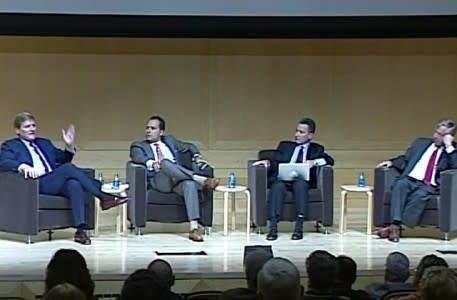Debate: Does the President have the right to raise the debt ceiling?
Does President Obama have a duty to raise the debt ceiling without Congress if there is danger of a default? Or would such an act be outside of the Constitution? Three leading constitutional experts debated that thorny issue in a special event at the National Constitution Center this week.
In our first Town Hall Tuesday event, Sean Wilentz from Princeton University, Ilya Shapiro from the CATO Institute and Neil H. Buchanan from George Washington Law offered differing viewpoints on this multifaceted subject.
The debate over the 14th Amendment and the debt ceiling first surfaced in 2011 when President Barack Obama and Congress fought over the budget and the debt ceiling. It was former President Bill Clinton who set off the debate when he told an interviewer he would have no problems acting without Congress – citing the amendment’s Public Debt clause.
The Obama administration quickly said it didn’t buy the 14th amendment argument, but the debate has continued on — and on.
The Public Debt clause is in Section 4 of the 14th amendment, and reads in part, “the validity of the public debt of the United States, authorized by law … shall not be questioned.”
Wilentz pointed to the original intent of the 14th amendment, when it was debated in Congress after the Civil War. He says Senator Benjamin Wade led the debate at the time.
“Wade made it very, very clear that’s exactly what he wanted—to prevent the U.S. debt from being played, so that future Congresses , ‘majorities in Congress’ I think is the phrase he used … so that the debt wouldn’t be subject to the whims of Congress, which is as close as you can imagine to addressing the problem we have today,” Wilentz said.
“This is not so difficult for me to parse, which is that any action by Congress, the President or any other official to question the debt, and just not violate the debt, but even questioning the debt is unconstitutional,” he added. “And any action that would trip off a default in unconstitutional. I don’t think there is much debate about that.”
Shapiro said the exact meaning of “questioning the debt” is ambiguous as best.
“What is debt? Does it just mean the bonds that are issued? Does it mean appropriations that Congress made or entitlements now in the modern era? It’s unclear. There are active debates about this. And what does it mean to question the debt? For example, anytime that Congress starts spending a lot of money, that could endanger at some future point our ability to pay it back,” Shapiro said. “There is some question of what exactly constitutes an unconstitutional questioning of the debt.”
Buchanan pointed to the Supreme Court’s 1935 Perry decision as “persuasive authority” on the broader subject. “It is the only Supreme Court statement on this issue. It is darn persuasive authority,” he said.
Buchanan said the Perry opinion confirmed that the Public Debt clause “was made part of the Constitution,” and that the United States can only default on its debt due to an action by Congress, no matter how much debt is issued.
Buchanan also spoke in detail about a theory he developed with Professor Michael Dorf about the “trilemma,” a situation where a President might need to act to prevent a default by choosing one of several unconstitutional options.
“Our argument is a separate constitutional argument, even if Section 4 of the 14th Amendment wasn’t there,” he says. “What happens when the President gets to the point when the debt ceiling is reached and the last of the extraordinary measures has been carried out by the Treasury Department, and he has obligations that are legally binding payments he has to make on a given day, and a certain amount of money is coming into the Treasury that day, and they don’t match up? Normally, he has the authority to borrow. But if the debt ceiling is there and it has not otherwise been deemed unconstitutionally invalid, then he has what we call the trilemma.”
“Congress has given [him] three things: spending laws, taxing laws and debt limit law. They don’t add up. They literally don’t add up as a matter of arithmetic,” Buchanan said.
That forces the President to choose one of three options, each of which is constitutionally invalid, Buchanan says, giving the President the choice of violating the debt-ceiling law, raising more taxes than allowed by Congress or defaulting on the legally binding debt.
Buchanan believed the President would choose the option that causes the least damage constitutionally and he would set aside the debt-ceiling law.
Wilentz said he was sympathetic to Buchanan’s argument, but he believed there is another constitutional option.
“What do you do when a Congress violates a Constitution? You can’t impeach a Congress. You can impeach a President but you can’t impeach a Congress. This is nothing the Framers though about too much.”
Wilentz didn’t think the President could do much until a default occurs, but then he was bound by his oath of office to “repair the Constitution.”
Shapiro said “both arguments, whether you like them or not, aren’t constitutional, they are extraconstitutional. They are pragmatic ones.”
“How do you apply principles of pragmatism to the oath of office? Which law is stronger: the debt ceiling law or the law of some little appropriation like the National Constitution Center?” he said.
Wilentz concluded that the constitutional conversations over issues like the 14th amendment and the debt ceiling are essential.
“This is a constitutional crisis we’re in. We’re there and it’s going to be there for a while,” he said. “That’s why these conversations are so important.”
You can watch the full 60-minute discussion below in our video player or click on the following link for direct access: https://vimeo.com/78212969
Recent Constitution Daily Stories
Is Ted Cruz a natural-born citizen eligible to serve as president?
The Senate showdown about the D.C. Circuit


